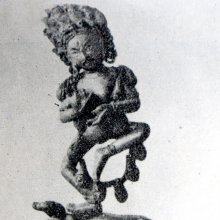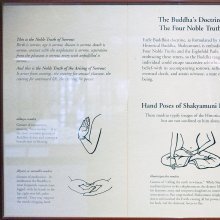Unpleasant: 1 definition
Introduction:
Unpleasant means something in Hinduism, Sanskrit. If you want to know the exact meaning, history, etymology or English translation of this term then check out the descriptions on this page. Add your comment or reference to a book if you want to contribute to this summary article.
Images (photo gallery)
In Hinduism
Natyashastra (theatrics and dramaturgy)
Source: Shodhganga: Elements of Art and Architecture in the Trtiyakhanda of the Visnudharmottarapurana (natya)The Unpleasant (expression) is associated with Mandā: one of the “six movements of the nose” (in Sanskrit Dramas), as conveyed through Āṅgikābhinaya: one of the four divisions of Abhinaya or “ways to convey or represent one’s emotion to others”, according to the Nāṭyaśāstra and the Viṣṇudharmottarapurāṇa, an ancient Sanskrit text which (being encyclopedic in nature) deals with a variety of cultural topics such as arts, architecture, music, grammar and astronomy.—The āṅgikābhinaya includes the histrionic representation of the limbs which is simply known as physical gestures. In the Viṣṇudharmottarapurāṇa as well as in the Nāṭyaśāstra, the varieties of nose movements have been mentioned in feminine gender. The mandā movement (i.e., “lowered nostrils”) denote the unpleasant state.

Natyashastra (नाट्यशास्त्र, nāṭyaśāstra) refers to both the ancient Indian tradition (shastra) of performing arts, (natya—theatrics, drama, dance, music), as well as the name of a Sanskrit work dealing with these subjects. It also teaches the rules for composing Dramatic plays (nataka), construction and performance of Theater, and Poetic works (kavya).
See also (Relevant definitions)
Query error!
Full-text (+514): Apriya, Duhkha, Priyapriya, Vipriya, Katu, Ashubha, Shubhashubha, Virasa, Asatavedaniya, Katukti, Asukha, Durbhaga, Pratikula, Durdarsha, Anabhimata, Apriy, Asaumya, Duhsprisha, Duhsparsha, Durgandha.
Relevant text
Search found 291 books and stories containing Unpleasant; (plurals include: Unpleasants). You can also click to the full overview containing English textual excerpts. Below are direct links for the most relevant articles:
Maha Prajnaparamita Sastra (by Gelongma Karma Migme Chödrön)
The Śalyatvena-sūtra (Sallattena-sutta) < [Chapter XXXVII - The Ten Concepts]
The Abhavya-sūtra < [Part 1 - Eliminating the three poisons]
Class 6: The eight spheres of mastery (abhibhvāyatana, abhibhu-āyatana) < [Class (5) liberations, (6) masteries and (7) totalities]
Vipassana Meditation (by Chanmyay Sayadaw)
Chapter 4 - The Four Foundations Of Mindfulness
Part 2 - Mindfulness Of Feeling < [Chapter 4 - The Four Foundations Of Mindfulness]
Part 1 - Chain Of Cause And Effect < [Chapter 4 - The Four Foundations Of Mindfulness]
Abhidhamma in Daily Life (by Nina Van Gorkom)
Bhagavati-sutra (Viyaha-pannatti) (by K. C. Lalwani)
Chapter 9: Objects of senses < [Book 3]
Part 3 - Karma, pleasant and unpleasant < [Chapter 6]
Part 6 - On life in the mother’s womb < [Chapter 7]
World Journal of Pharmaceutical Research
Isolation of bacteria from iron and steel industry effluent < [2017: Volume 6, July issue 7]
Ayurvedic management of halitosis – a case study < [2023: Volume 12, October issue 17]
A comprehensive review on taste masking < [2023: Volume 12, August issue 13]
Tattvartha Sutra (with commentary) (by Vijay K. Jain)
Verse 8.8 - The two kinds of feeling-producing karma (vedanīya) < [Chapter 8 - Bondage of Karmas]
Verse 6.11 - The nature of Unpleasant-feeling Karmas < [Chapter 6 - Influx of Karmas]
Verse 7.10 - Contemplations regarding suffering (duḥkha) < [Chapter 7 - The Five Vows]
.jpg)

